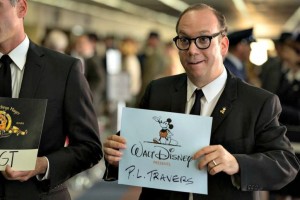When I first saw the previews for the 2013 John Lee Hancock film “Saving Mr. Banks,” I can say with complete honesty I knew nothing about the plot – or about the significance of the story being told. Accompanied by my Disney-obsessed date, I departed the theatre having witnessed one of the best films I had ever seen, and gaining a new respect and appreciation for a classic story I had heard referenced thousands of times before and had never once watched.
The telling of historical events in a cinematic story can be a tricky endeavor and one that runs the risk of missing the mark on a number of areas. Often, the road to making an entertaining film based on history may mean artistic liberties must be taken, with the sacrifice coming at the hands of accuracy. “Saving Mr. Banks” was written by Kelly Marcel and Sue Smith, and holds true to the real life events depicted in the story as they play out in a near biographical fashion.
“Saving Mr. Banks” tells the account of Australian author P.L. Travers, the creator of the iconic “Mary Poppins” book series, and her two-week trip to Los Angeles in 1961 in which the legendary Walt Disney attempts to persuade her into signing over the screen rights for her stories, the result being a virtual movie in a movie.
The story jumps back and forth between two highly distinctive points in time; from the poverties of an Australian farm in the early 1900s, to the present day (1961) bustling epicenter of entertainment in Los Angeles. The acting in the film is so powerful you’ll instantly feel the life brought forth by the characters, many of which seemed destined for Oscar takedowns.

As a highly esteemed author, P.L. Travers (Emma Thompson) has spent twenty years penning her “Mary Poppins” book series with a no-nonsense, hard edged approach. Throughout the movie, her childhood is shown as she grows up in relative poverty in Australia and her very close relationship with her alcoholic and unsuccessful father (Colin Farrell) is identified, the result becoming the basis for the Poppins characters and stories.
For the twenty years Travers has been writing, she has also been hounded by Walt Disney (Tom Hanks) who has a strong desire to make the Mary Poppins story into a feature length movie. At the behest of her agent, Travers flies to Los Angeles to meet with Disney to discuss selling the story rights and overseeing the writing of the script. Travers has initial doubts about the proposal, feeling that Disney will simply commercialize and make cartoonish the art she has created.
Coupled with the laughs are the very serious flashbacks depicting Travers childhood difficulties, as she plays a firsthand witness to the deterioration of her carefree and loving father, and the pain it brings to her mother (Ruth Wilson) and siblings. One can immediately empathize with Travers and her creation of the character Mary Poppins. It also becomes clear why she has such strong quirks and requirements that Disney must adhere to if they are to make her story into a film. Anyone who has ever written fiction will immediately understand the dilemma she faces, with the prospect of someone else obtaining the rights to a character she has created, and ultimately invested her soul into.
Having never seen the 1964 Disney classic “Mary Poppins” with its all time great performances by Julie Andrews and Dick Van Dyke, and having never read any of the books, I went in with a clean slate and learned a great deal about an author and a story I had previously never heard of. Anyone who is a die-hard Disney fan will surely appreciate the telling of how the Poppins movie was brought to life. If you’re like me and have never watched it, you’ll gain a new appreciation for an American classic movie and all time literary relic.
by – Matt Christopher
2 Comments
Emma Thompson is by far the best part of the movie. I admit I felt Giamatti was kinda pointless in the movie. And while I did like the movie as a whole, some scenes made me wish I was watching Mary Poppins instead.
The author of Mary Poppins was a miserable person. The flashback scenes were dull and boring. This movie was only saved by the great acting of Thompson and Hanks.